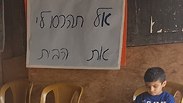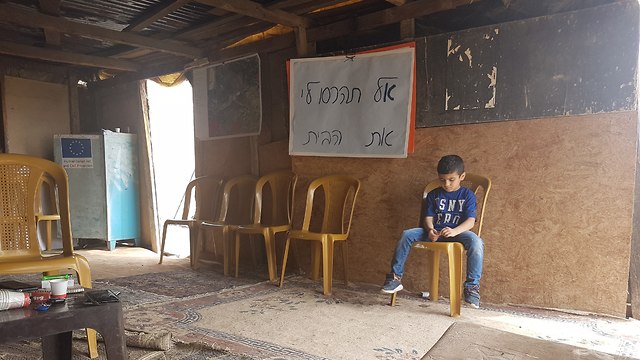
Bedouin village in the West Bank
Photo: B'Tselem, Amit Gilutz

Israel's top court says West Bank village can be demolished
Following an injunction that was issued against Khan al-Ahmar's demolition over a month ago, High Court of Justice rejects appeal and rules that village can legally be torn down; Defense Minister Lieberman praises decision calling judges 'brave' and adding that 'no one is above the law.'
The High Court of Justice on Wednesday rejected an appeal against the demolition of a Bedouin village in the West Bank, ruling that its stay would expire in a week and the spartan encampment could then legally be torn down.
The fate of Khan al-Ahmar, east of Jerusalem, has drawn heavy international attention, with the United Nations and others expressing grave concern, and has become a rallying cry for the Palestinians, whose leaders have gathered there to protest its planned demolition.
Israel claims the village, an encampment of corrugated shacks outside the Kfar Adumim settlement, was illegally built and has offered to resettle residents 12 kilometers, about 7 miles, away. But critics say it's impossible for Palestinians to get building permits and that the demolition is meant to make room for an Israeli settlement.
The three judges hearing the appeal said they were presented no evidence to warrant overturning the previous verdict and there was no question over the illegality of the construction on the site.
Defense Minister Avigdor Lieberman lauded the judges for their "brave" ruling.
"No one is above the law. No one can stop us from implementing our sovereignty and responsibility as a state," he said.
The village is in the 60 percent of the West Bank known as Area C, which remains under exclusive Israeli control and is home to dozens of Israeli settlements. Israel places severe restrictions on Palestinian development there and home demolitions are not unusual.
As part of interim peace deals in the 1990s, the West Bank was carved up into autonomous and semi-autonomous Palestinian areas, known as Areas A and B, and Area C, which is home to some 400,000 Israeli settlers.
The Palestinians say that Area C, home to an estimated 150,000 to 200,000 Palestinians, is crucial to the economic development of their future state.
Israel says the structures that make up the Khan al-Ahmar encampment, which include an Italian-funded school, pose a threat to residents because of their proximity to a highway. But critics have dismissed this claim as a ploy to remove the village's 180 or so residents to clear the way for new Jewish settlements.
The UN High Commissioner for Human Rights' office has called on Israel to abandon its plans and said the destruction of private property by an occupying power violates international law.
The West Bank's Arab Bedouin are a small, impoverished minority among the broader Palestinian population. Like many other Bedouin encampments, residents of Khan al-Ahmar live in corrugated shacks or tents, often without electricity or running water, and raise livestock.
The Palestinian ministry of education recently decided to start the schoolyear early for 170 elementary students in Khan al-Ahmar and four nearby Bedouin communities to try and pre-empt any Israeli move.
















